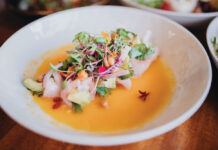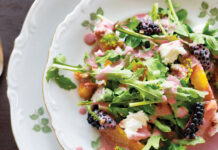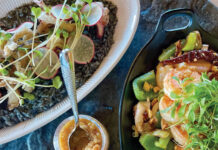Story by Becky Speere
When our daughters were in school, countless clubs and activities vied for our precious dollars. Seems as though someone was always selling huli huli chicken, chili and rice, malasadas or chocolate bars to fund a class excursion to the Maui Ocean Center; charter a bus for middle-school students to see an exhibit at the Maui Arts & Cultural Center; or send a band, hula troupe or sports team to a competition on another island.
Maui’s food-driven fundraisers continue to nurture a host of worthy causes, from children’s programs, to providing relief for victims of disasters in Hawai‘i and beyond. A local lunch-truck owner even donates his tip jar each month for families in need.
We’re proud to note how many ‘Aipono-winning Maui chefs and restaurateurs are behind these humanitarian efforts. Whether they took home an award for great food or service or the ambiance of their venues, they all deserve recognition for the goodness of their hearts. Here are just a few.
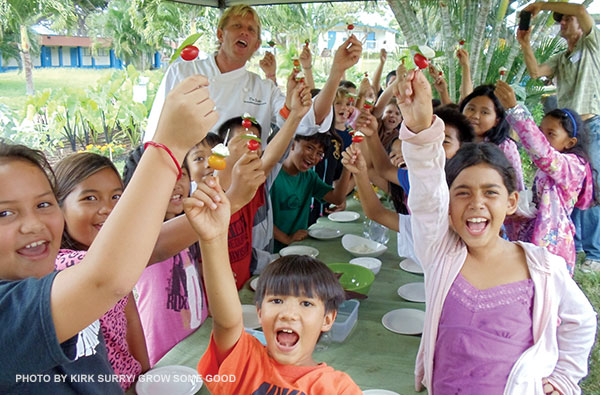
Young at Heart
Over the years, Hotel Wailea’s Capische? restaurant has won half a dozen ‘Aipono Awards for Most Romantic Setting. But chef/owner Brian Etheredge says his first visit to Kihei Elementary School, in 2009, was where “I felt my heartstrings being pulled. I knew this was the thing to do.” Etheredge, ‘Aipono’s 2008 Chef of the Year, had just been introduced to Grow Some Good, a program that teaches students about healthy eating by establishing school gardens. Grow Some Good began at Kihei Elementary, and for Etheredge it was love at first sight. He and private chef Dan Fiske obtained funding for a part-time garden coordinator, and gave youngsters cooking classes with recipes incorporating the foods they grew in that garden.
Today, with the continued support of Etheredge and more than a dozen other Maui chefs, what began as a single raised plot of soil at Kihei Elementary has become a quarter-acre garden tended by the entire student body — and Grow Some Good has expanded to ten more isle schools.
Seed Money
The winner of ‘Aipono’s 2015 Lifetime Achievement award, Paris Nabavi is another Maui chef who believes the way to a healthy student body is through organic foods kids learn to grow themselves. Troubled by the epidemic of childhood obesity and diabetes, Nabavi joined forces with the Maui School Garden Network, a nonprofit organization that works in tandem with Grow Some Good by connecting educators with experts, grants and other fundraising ideas. The goal: to give schools ownership of programs that teach kids to grow their own healthy food — and with it, a sense of independence.
Nabavi’s role? Throughout the year, he raises funds that provide organic seeds for fifty-two schools, pre-kindergarten through twelfth grade, on Maui, Moloka‘i and Lana‘i.
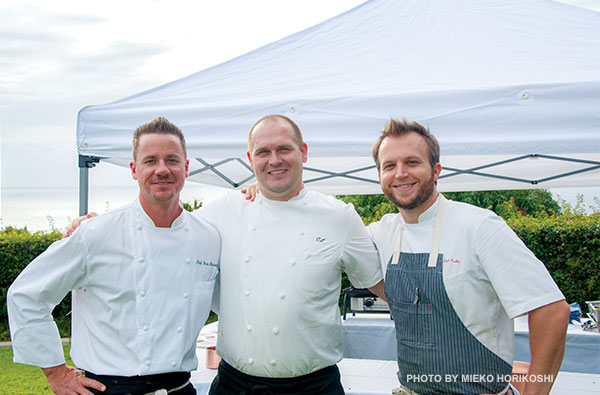
Meating the Challenge
Cameron Lewark wears many hats as chef de cuisine of Spago Maui, winner of this year’s Gold ‘Aipono Awards for Best Service and Best Hawai‘i Regional Cuisine. The hat he dons when he’s not at work is camouflage. Dressed in camo fatigues, Lewark heads Upcountry or onto golf courses in the wee hours before dawn, or, with permission, on private land, in search of axis deer.
There’s more to this than a love of the hunt. Lewark’s target is an invasive species whose burgeoning herds ravage farms and ranches, costing millions of dollars in damage to local agriculture and also compromising safety on the island’s roads. When the County of Maui mounted its Maui Axis Deer Harvesting Cooperative in 2012, Lewark volunteered. “I saw this as a great opportunity to do what I enjoy and help at the same time,” says ‘Aipono’s 2010 Chef of the Year.
Besides controlling the deer population, Lewark thinks the harvest can help develop a meat industry here that promotes venison as a sustainable resource. “If we can harvest the meat, we will be able to import less from the mainland. It’s local and free range.”
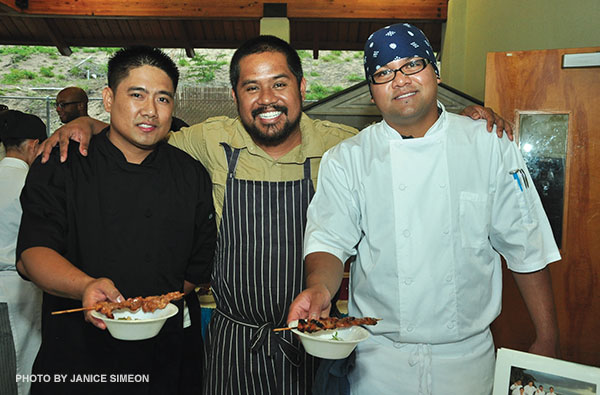
Kai Na!
On October 15, 2013, a devastating 7.2-magnitude earthquake struck the central Philippines, followed weeks later by super typhoon Haiyan. Those two natural disasters damaged or destroyed 1.1 million homes; killed 6,300 people and displaced another 4.1 million. Jojo Vasquez, executive chef of Plantation House Restaurant and Pineapple Grill, felt moved to help. Partnering with his wife, Eliza, and Jake Belmonte, chef-instructor at Maui Culinary Academy, Vasquez organized the fundraiser Kain Na! (Tagalog for “Let’s eat!”). Fourteen other Maui chefs participated, including Ka‘ana Kitchen’s Isaac Bancaco and MiGRANT’s Sheldon Simeon, past ‘Aipono Chefs of the Year.
Vasquez, whose restaurants garnered this year’s Gold ‘Aipono for Best Breakfast (Plantation House) and Silvers for Best Steak and Best Dessert (Pineapple Grill), says, “The Filipino community came together . . . to lift up one another and help those in dire need. There was a great feeling of support.”
Support, indeed: the sold-out event raised more than $20,000 for disaster relief.
Project Kokua
Hurricane Iselle had been downgraded to a tropical storm by the time she swept past Hawai‘i in August 2014, but she tore through the Big Island’s Puna District, turning trees into toothpicks, leveling homes, downing power lines and causing $68 million in agricultural losses. As Chef Lyndon Honda tracked the storm’s path and intensity, he knew he had to do something to support his former island home. Honda, who had served as corporate chef at perennial ‘Aipono Award winners Aloha Mixed Plate and Old Lahaina Lu‘au, turned his talents to creating Project Kokua (“help”). Local purveyors gave generous donations of food and supplies, and isle businesses and individuals contributed 170 items for a silent auction. And twenty-eight of Honda’s industry colleagues rallied to help — including Ivan Pahk (‘Aipono’s 2007 Chef of the Year), Japengo’s Gevin Utrillo (2015 Golds for Best Sushi and Best Pacific Rim Cuisine), Wes Holder of Pulehu (2015 Gold for Best Italian Cuisine), and Tylun Pang of Ko (2015 Gold for Best Hawai‘i Regional Cuisine and Silver for Best Shave Ice; Pang himself is a past winner of ‘Aipono’s Friend of Agriculture and Lifetime Achievement awards).
Three weeks following the disaster, Project Kokua filled Maui Tropical Plantation’s Mill House Restaurant with 300 upbeat attendees. As I milled around the food stations, I could sense the community pride emanating from our chefs, who, though busy filling our ‘opu (bellies), somehow always find time to give back from the heart.
Project Kokua raised $28,414 for Hawai‘i Island Food Bank, and $750 for thirty-one farmers to purchase seeds. This past February, Honda organized another Project Kokua on the Big Island, raising an additional $14,713. Honda says, “You gotta give back, you know? Don’t have to only be on Maui. We are all one family! We had two hundred volunteers who felt the same way.”


